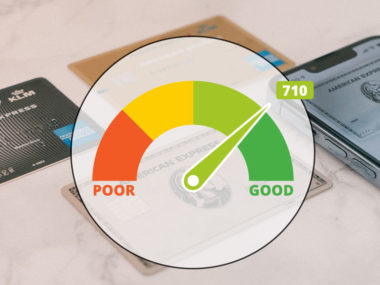Your credit score and credit history contain valuable personal information, and only businesses that need direct access to your financial information can access your credit report.
Organizations that need fast access to your credit will conduct a soft credit check, which doesn’t impact your credit score and keeps sensitive information private. You can perform a soft credit check on your credit report to check your credit score.
If an organization needs an official credit check, it will conduct a hard credit inquiry. Hard credit checks can lower your credit score by up to five points and stay on your credit history for two years. A lender or organization cannot conduct a hard credit check without your permission.
Table of Contents
Organizations That Can Look at Your Credit Reports
Several organizations can look at your credit score, including banks, landlords, collection agencies, and more. Here is an in-depth list of entities who can access your credit report through soft credit checks or hard credit checks.
Banks
Banks may check your credit if you’re opening a checking or savings account. However, your credit will not affect whether the bank approves you. Instead, banks use a program that shows the customer’s history of deposit accounts and reports unpaid negative balances, overdraft fees, bounced checks, and fraud.
Opening a bank account won’t impact your credit score. Banks will not conduct a hard credit inquiry for simply opening a checking or savings account.
Creditors
Creditors will pull your credit report when you apply for a new credit card, auto loan, or mortgage. When negotiating loan terms, creditors and lenders use your credit score to determine the loan rate. Those with high credit scores will qualify for better loan rates.
Some creditors will conduct a soft credit check while others conduct hard credit checks. If you’re trying to avoid hard credit inquiries on your account, ask the creditor beforehand which type of credit check they need.
Collections Agencies
Collection agencies have access to your credit report and account information. Collection agencies become involved when you’re unable to pay off a debt, and the lender sells your debt to an agency. The agency will then pursue payment for the delinquent account.
To understand your payment habits and collect information about your account activity, collection agencies may pull your credit report. They cannot ask for a hard credit inquiry without your permission.
Student Loan Providers
A student loan provider will conduct a credit check before offering a loan. Student loans are available in the form of PLUS loans, federal loans, or private loans. Each loan type will check your credit score by the lender before negotiating the loan details.
Similar to other organizations, a student loan provider cannot conduct a hard credit check without your permission. Always read the fine print before signing a contract or agreeing to terms and conditions to ensure you’re not agreeing to a hard inquiry.
Utility Companies
Utility companies may conduct a soft credit check when you sign up for their services. When a utility company performs a credit check, they’re checking your likelihood of staying up-to-date on payments. Utility companies are unlikely to attempt a hard credit check.
Most states have laws that prevent utility companies from denying you service based on your credit score; however, you may have to pay a deposit if you have bad credit.
Phone Companies
Phone companies may conduct a credit check before offering their services. Similar to companies that offer gas and electricity, phone companies aren’t allowed to deny services based on your credit score in most states.
However, they can increase your rate or require a deposit if your credit score is low enough to warrant concern.
Insurance Companies
Insurance companies look at a version of your credit score called your credit-based insurance score. This credit score weighs many of the same factors but focuses on your likelihood to file an insurance claim.
Those with poor credit-based insurance scores will have higher rates. About 95% of car insurance providers check credit-based insurance scores.
Landlords
To ensure the renter has a history of making monthly payments on time, a landlord will check their credit report with a soft credit inquiry. Landlords may also check the renter’s rental history.
Employers
Employers may conduct a soft credit check to ensure that the person they are hiring is trustworthy and responsible. They will not pull your credit report without permission, meaning that you can choose which employers have access to your credit report.
Employers use soft credit checks and won’t gain access to your personal information such as your birthday, account numbers, and Social Security number. The report only includes your credit history, missed payments, and other major financial decisions.
Government Agencies
Government agencies can pull your credit report if they need your personal information to make a decision.
It’s important to note that a government agency won’t pull your credit report randomly; they conduct a credit check if they are making a decision that impacts you, such as determining child support or public assistance.
Any Entity With a Court Order
Court orders allow any entity to pull your credit report. However, to obtain a court order, the entity must go through a lengthy process of proving why they need to see your credit report. If an entity has a court order to see your credit report, they can pull your credit report.
Who Can’t Look at Your Credit Reports?
Your credit information is not available to the public. If you’re an adult, your guardian cannot request your credit report and receive access without your permission. Additionally, your credit information is not public on the internet, meaning that someone cannot look up your credit score on a search engine.
Unless you show someone your credit score, they cannot access it. Entities without a business reason cannot pull your credit report unless they have a court order.
Is It Legal to Run a Credit Report Without Permission?
The Fair Credit Reporting Act (FCRA) restricts access to your credit report and limits who can access the report without your permission. The FCRA states that only business entities with a legitimate reason can access your credit without written permission. The general public cannot access your credit.
Tracking and Limiting Access to Your Credit Reports
If someone pulls your credit report, it will show on your credit history. The three major credit bureaus report when an entity requests access to your credit report. You can review who has accessed your credit report under the inquiries section.
If there is an unauthorized hard credit inquiry on your account, you can dispute the action and have the inquiry removed.
Those worried about fraud can “freeze” their credit. A credit freeze stays in place until you lift it, which you can do for free. Freezing your account blocks access to your reports from those attempting to steal your identity.
Image Source: https://depositphotos.com/





